Lan Ling was the name of a warrior king in ancient China whose kindly face had the unfortunate effect of failing either to inspire his troops or terrify his enemies. To overcome this handicap, he decided to wear a fierce mask whenever he went into battle. The ruse was so successful that he was deified, and eventually became the patron saint of the theater.
It is very appropriate, therefore, that one of the Republic of China's most avant-garde theatrical groups should have adopted his name. The Lan Ling Theater Workshop has been responsible for some of the most exciting dramatic performances during the past decade in Taiwan.
Members of the Lan Ling group have breathed new life into modern Chinese Theater as a result of continuous experiments and the adoption of new ideas. Although they have no specialized back ground, academic training or economic resources, they have managed to present such ground-breaking and widely acclaimed works as "Ho Chu's New Match," "Cats' Paradise," "Burden," "Homework," "Rooster and Apartment," and many others. Recently, a musical entitled "New Spring Folksong," was presented to raise funds for folk artists.
On June 30, Lan Ling presented a new version of "Rooster and Apartment" to start a series of performances at the Arts Hall in Taipei. Divided into five acts, this comedy of manners describes how a rooster is brought back to an apartment in Taipei from the countryside. The play has adopted the technique of Shu lai pao (in the manner of a beggar who chants flattering rhymes) and modern dialogue. Orchestrating special choreography to the music of Wen Lung-chun, the piece includes a favorite Lan Ling device--animal personification.
Another play, entitled "Homework" uses symbolic techniques to express the alienation among people, particularly the psychological conflicts arising between father and son. The stage director employs limited dialogue and special lighting and sound effects to outline the internal conflicts among people. Flashlights are used to create a nightmare effect during a flogging scene.
Many critics in Taiwan hold that the Lan Ling group has done for the Chinese theater what Cloud Gate did for Chinese dance.
The workshop started when veteran members of Lan Ling, Chin Shih-chieh and Cho Ming took over the Tien Experimental Theater Group and gathered around them a group of friends who loved movies and the theatrical arts. Members of the group comprised people from all sectors of society, including nurses, public functionaries, photographers, students, TV talk program hosts, housewives, and even the temporarily unemployed. After a day at the office, they often meet together at the theater for refreshments. They have become so familiar with each other, that each has been given a nickname, such as "Squid," "Mediterranean," "Kimbo," "Toast," "Piggy," and even "Scrambled Egg."
The group's artistic director is Professor Wu Jing-Jyi, a Ph.D. in Educational Psychology, who worked at La MaMa Experimental Theater Club in New York. His contribution proved to be of pivotal importance.
Realizing that the Chinese are by nature reserved and shy, and have to work hard before they can deliver a natural stage performance, Prof. Wu's first task was simply to get them to relax. Then they are encouraged to imitate the calls of cats and dogs, to tell stories, to play games, to "talk" to tables and chairs, or to mimic the actions of animals. This proved to be more difficult than it seemed, and many actors left the group.
As time passed, however, some members of the group began to develop their own sense of theater. As in gestalt psychology, certain mental and physical blockages break down, and mind and body start to flow in unison. Prof. Wu pointed out that theater workshops should adopt training programs based on each country's culture. In the case of Peiping opera, for instance, actors are required to perform their movements while carrying burning incense to light their way. Lan Ling also uses such isolation training. Actors must show such qualities and emotions as seductiveness, anger, suspicion or happiness first using their eyes, and then their mouths, heads and hands separately, before putting them all together.
Today, every member of the Lan Ling group is so versatile that each is an actor, director and scriptwriter rolled into one. "I never even dreamed I could be an actor, let alone a script writer," said one member. "The creative strength I find on stage turns me into a sensitive person. What matters is not that I am an actor, but that I am a 'rich' person. I learn how to portray all human emotions. For instance, I like to observe people on the bus, and try to imagine their life stories. Lan Ling provides an environment for all its members to develop fully their creative potential. I am rewarded by all my performances, and I think the stage is a fascinating career."
The greatest blockage to Lan Ling's future progress is lack of financial re sources. At first, members did not have anywhere for rehearsals. They decided to pay for the costumes, property, make-up and stage props from their pockets, and hope the performances would reimburse them. As one member said: "Through these grass-roots contacts, the group grew to be more like a family."
Chin Shih-chieh pointed out that the group should still be regarded as amateur, since all profits go toward the acquisition of a rehearsal room. All members still hold outside jobs. While Lan Ling builds up its own confidence, Chin is content to get by on small profits from performances, and individual donations. Among some of the most well-known supporters are leading film director, Lee Hsin, famous artists Ho Hui-suo and Tung Yang-tze, writer Lee Un, professors Yao Yi-wei and Huang Mei-hsu, and members of the Cloud Gate Ensemble.
Australian Chris Doyle, nick-named Piggy after a character in "Pilgrims to the West," and the only foreigner in the group, has traveled all over the world since he graduated from college. "Given the present vigorous cultural environment in Taiwan, young people can win encouragement and a feedback from society if they work hard. I can find no other place in the world with such a wonderful atmosphere."
Members of the group take every opportunity to see films of the U.S. dance series presented by the International Communications Agency, to appear on stage for impromptu performances with Cloud Gate, or to enjoy performances of Peiping opera at the Armed Forces Cultural Center. They find inspiration in all quarters, and constantly try to work out the right direction for Chinese Theater to follow.
Lan Ling may well be a harbinger of a new spring in the relatively dormant field of Chinese theater. If a splendid summer and a rich harvest in autumn is to follow, the public will have to give these enthusiastic young artists all the encouragement they deserve.
[Picture Caption]
Left: As its entry in the second session of the exhibition of experimental theater, Lan Ling presented a play entitled "Homework," in which the only two actors Chin Shih-chieh and Huang Chen-huan put in outstanding performances. Lighting in this play is regarded as being particularly effective. Right: Ten minutes before a performance, Prof. Wu Jing-Jyi (left) leads all the actors in doing warm-up exercises which help to boost their confidence and spirit of teamwork.
"Rooster and Apartment" is a comedy of manners based on the everyday life of people in modern times. 1. A country couple played by Kao Su-pin and Wang Jen-ii bring a rooster to Taipei to show their respects to their grand mother. 2. "My heart is in the land," the old woman says in objecting to her son's idea of selling ancestral property. 3. Each of two couples living in an apartment in Taipei has an ax to grind. Picture shows Chin Shih-chieh fretting after an argument with his wife.
Left: Since the company has no make-up artist, members of Lan Ling have to do their own make-up backstage. Right: Eighteen-year-old Chen Ming-wei, playing the rooster, is one of the new recruits at the workshop who won warm applause from the audience.
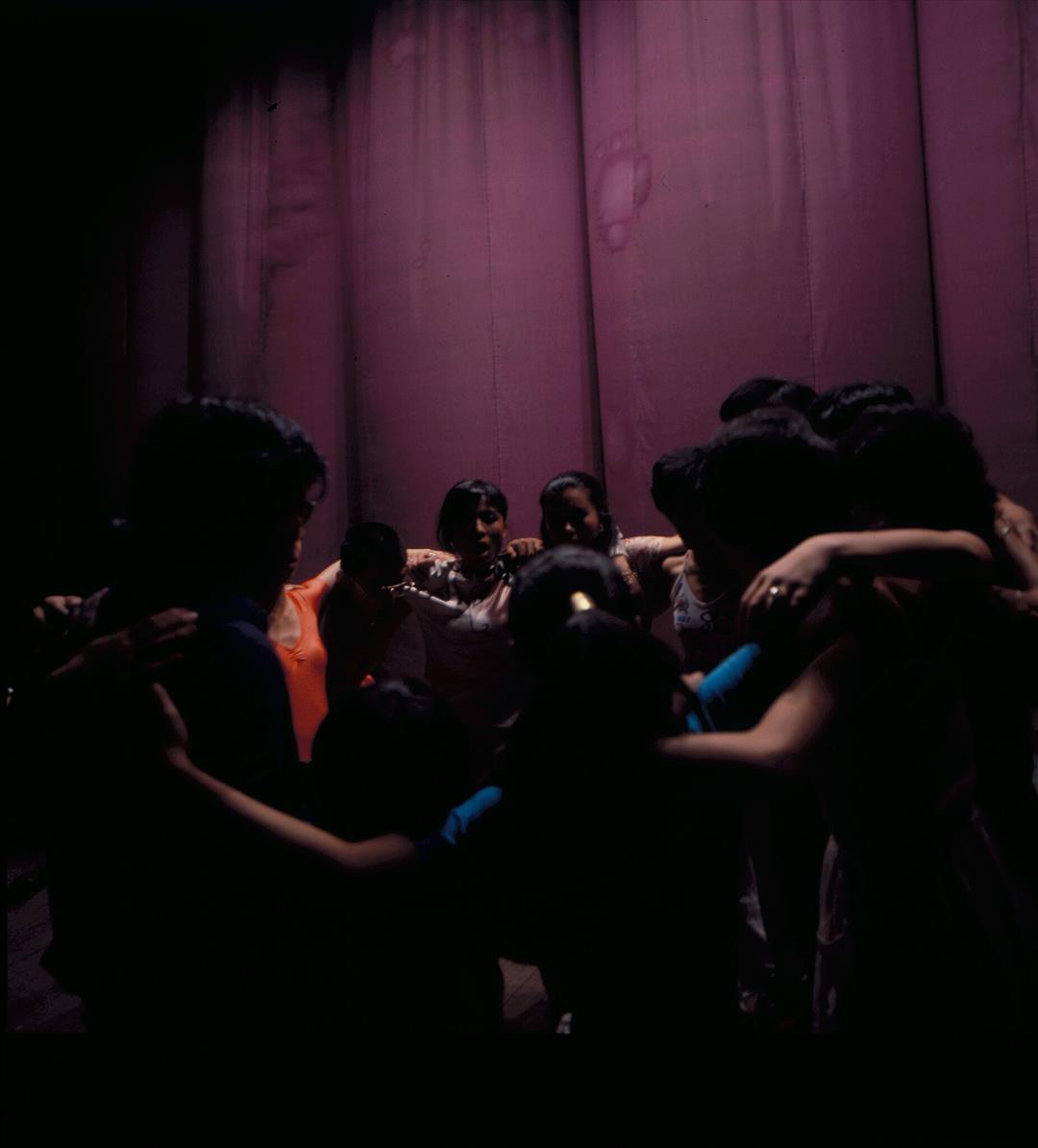
Right: Ten minutes before a performance, Prof. Wu Jing-Jyi (left) leads all the actors in doing warm-up exercises which help to boost their confidence and spirit of teamwork.
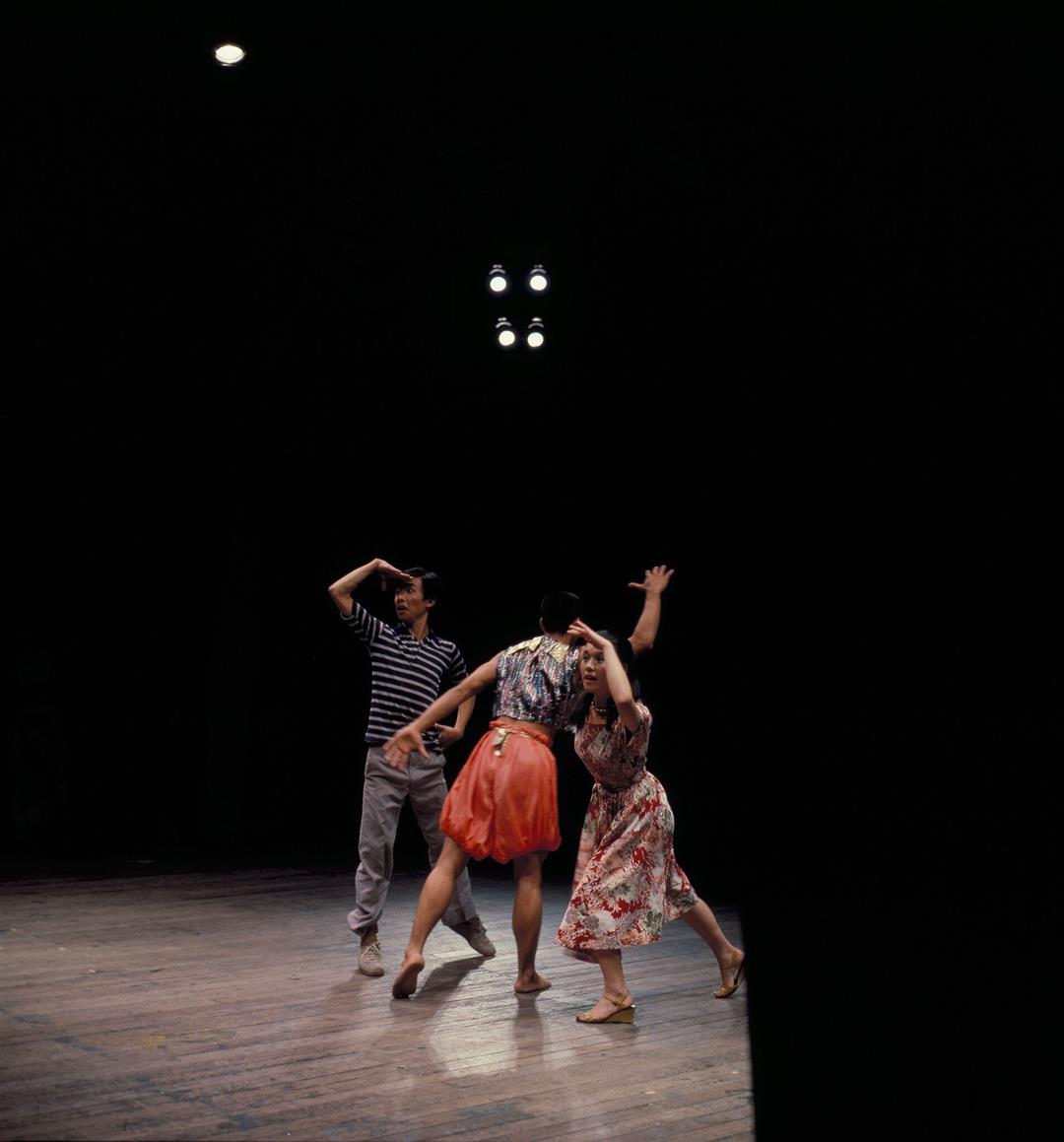
A country couple played by Kao Su-pin and Wang Jen-ii bring a rooster to Taipei to show their respects to their grand mother.
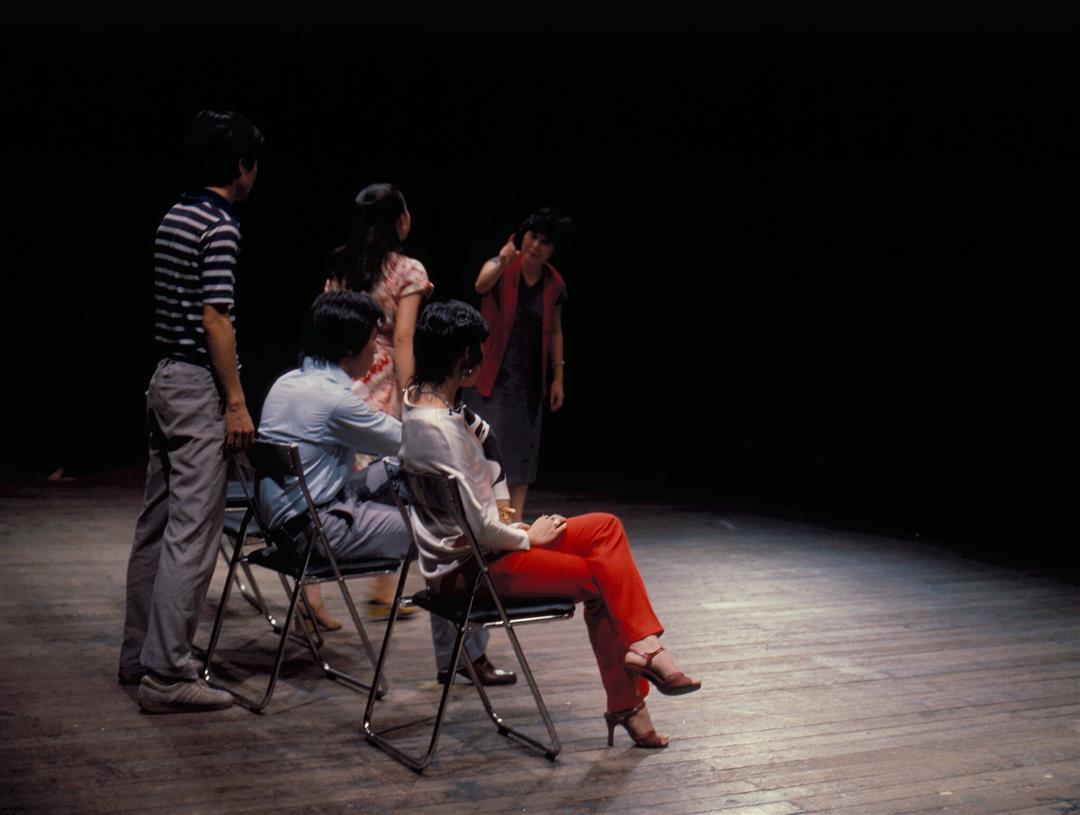
My heart is in the land," the old woman says in objecting to her son's idea of selling ancestral property.
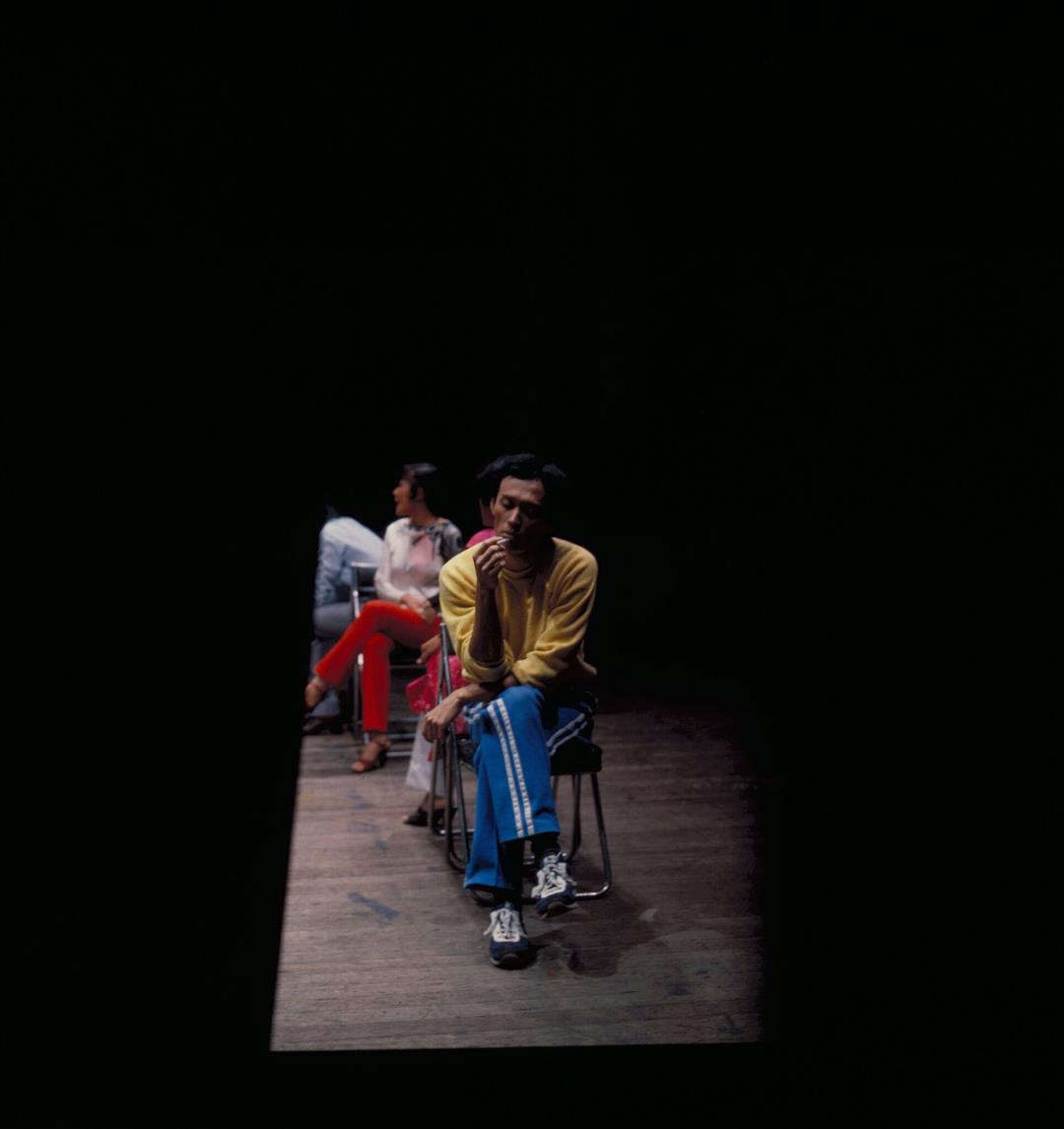
Each of two couples living in an apartment in Taipei has an ax to grind. Picture shows Chin Shih-chieh fretting after an argument with his wife.
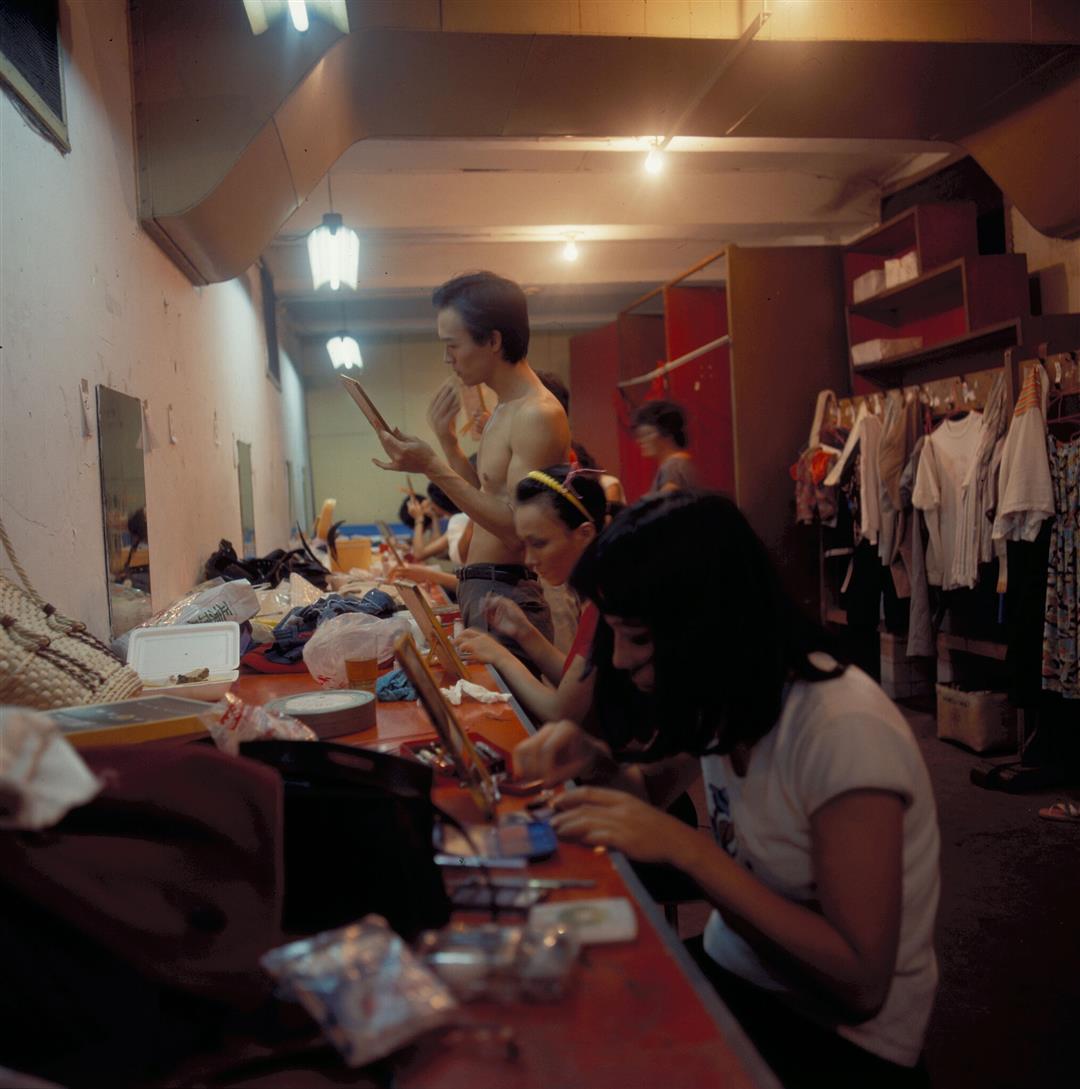
Since the company has no make-up artist, members of Lan Ling have to do their own make-up backstage.
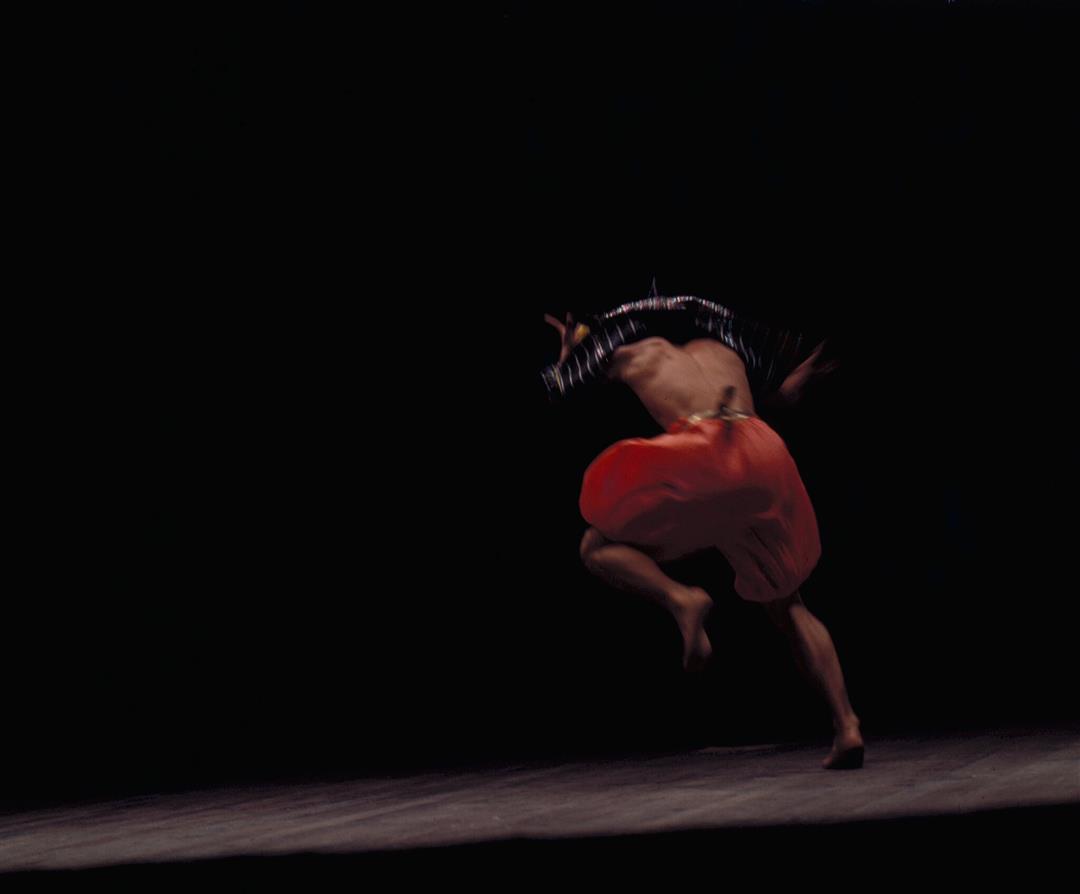
Eighteen-year-old Chen Ming-wei, playing the rooster, is one of the new recruits at the workshop who won warm applause from the audience.